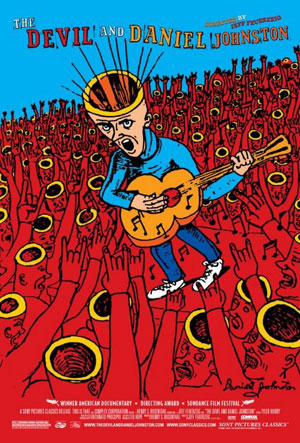 Was The Devil and Daniel Johnston supposed to make me this depressed? I can’t tell if the movie means to leave us somewhat hopeful or utterly devastated by the way God treats his own geniuses. I know that there’s a moment where Johnston’s father breaks down crying while recounting the small plane crash that his utterly insane son instigated where I knew no happy ending would make up for how I felt.
Was The Devil and Daniel Johnston supposed to make me this depressed? I can’t tell if the movie means to leave us somewhat hopeful or utterly devastated by the way God treats his own geniuses. I know that there’s a moment where Johnston’s father breaks down crying while recounting the small plane crash that his utterly insane son instigated where I knew no happy ending would make up for how I felt.
I was never a big Daniel Johnston fan, although I have always appreciated his minimalist pop majesty. Johnston’s an acquired taste, with his irritating voice and clumsy instrumentation, but his music is always brutally honest, especially about the mental illnesses that have ruined his life and left him a fat, old before his time man living with his parents.
The mental illness that destroyed him probably also made this film possible – Johnston obsessively documented his life, putting even Tarnation’s Jonathan Caouette to shame. But where Caouette’s recording of seemingly every moment of his life smacks of a serious narcissistic disorder, Johnston’s feels more desperate, like he’s looking for proof of his own existence, and a need to communicate that existence to anyone who will listen. At one point he’s taping himself getting into a fist fight with members of Sonic Youth and you have to wonder what the hell he’s thinking – but the next moment, as he breaks down in tears while powerfully performing in a small record store, makes you realize you’ll never know. In some ways the self-documentation fails; we see and hear what happened, but we’ll never know exactly why.
Johnston’s story begins as a young man in a religious household, where he exhibits the kind of shiftlessness and unhappiness and shyness so familiar to so many creative people. Later he leaves home and tours with a carnival; providence brings him to Austin, Texas, the most bizarre place in all the American South, sort of a rock and roll version of the Island of Misfit Toys. Johnston’s innate genius is understood here, and it briefly seems like the new Bob Dylan is coming. His timing is impeccable, since Austin’s music and film scene was on the verge of blowing up in a major way. But one night he dosed acid at a Butthole Surfers show. While I don’t generally buy into the concept that a single drug experience can change someone so much – well, let’s just say that spending eight hours with Locust Abortion Technician playing on headphones while exploring alternate realities on mescaline makes me believe that the Surfers are the only band in history who can drive you crazy.
Of course Johnston was always ill, but it’s at this point that things go downhill in a dramatic fashion, and his psychotic religious mania and occasional violent outbursts lead to a series of institutionalizations that make him possibly the only artist to get a major label deal in the nuthouse. And it’s here where the discussion of the line between genius and madness stops being so academic. As Johnston gets crazier and more dangerous, his music might be getting better, but the medication that keeps him from killing himself or others stupefies him to the point that he can’t create. It’s heartbreaking to watch.
One aspect that the film never explores adequately for me is the line between appreciation and exploitation – even when he was young and “sane,” Johnston’s music and performances were extravagantly oddball and outsider at best. And while the construction of his songs are pop classical, the presentation is anything but, so are the hipsters who adopted him enjoying Johnston for his truly unique yet traditional take on music, or is it a lark based on how completely weird the guy is? And how does that extend to me, watching the film, or other audience members who will be drawn to this film by the story and not Johnston’s music?
The film isn’t just made up of Johnston’s own recordings and footage; director Jeff Feuerzeig finds the key players in the musician’s life and interviews them. Their recollection, tempered by the years of tragedy Johnston has lived through, create a thoughtful coloration for the story. Occasionally they’re worth seeing on their own – Butthole Surfer Gibby Haynes denies giving Johnston that acid, and he’s interviewed literally while he’s getting his teeth drilled.
I hope that those who see this movie because it seems like a freak show, like it’s the indie rock version of your favorite dysfunctional reality TV show, come away with an understanding of the sometimes tragic cost of real genius. Late in the film Johnston is compared to Brian Wilson, and I think that’s fair, as is a comparison to other self-destructive artists as Van Gogh. So many of those who have been gifted so incredibly end up in bad shape because of their own insanity and addictions. Some manage to become incredibly famous, changing the face of the world with their art, before their own defects devour them. And some, like Daniel Johnston, come so tantalizingly close.